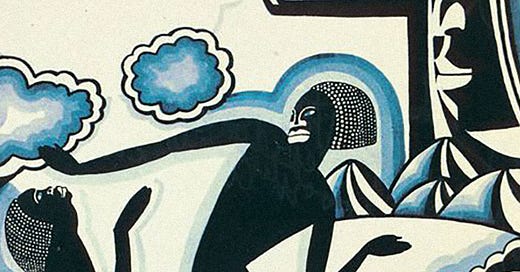THE SIGNAL from David Katznelson
"What happens to a dream deferred? Does it dry up Like a raisin in the sun?... Or does it explode?"-Langston Hughes
Today is the 120th birthday of one of the great poets and activists, Langston Hughes. A shining like of 20th Century artistry, a progenitor of the Harlem Renaissance, and (my favorite part of his legacy) one of the first and greatest writers of Jazz Poetry. His poetry sings when read, with its syncopation, onomatopoeia, and word choice that plays like a swinging combo in a smoky bar on the North North side.
I was in Ardent Studios with Jim Dickinson one late night when he was producing Mudhoney’s album Tomorrow Hit Today. Jim always brought to each session a series of CDs in a black box that he used as a base for what recordings should sound like: his favorite records to gain inspiration from and help guide him. We were talking about jazz…about the craziness of late-era Coltrane…and he pulled out his copy of Weary Blues from the black box and handed it to me to check out. Langston Hughes talking, Charles Mingus playing…we immediately threw it in to a player during a break in the studio action. I had never heard Hughes’ voice before…his voice reading one of my favorite of his poems, reading with the musical beat you would hope for accompanied by an amazing jazz band (actually, there are two separate jazz bands that divide up the duties, Leonard Feather and his combo killing it as well).
Weary Blues is just one of the huge library of incredible poems Hughes wrote. Some might argue that Let America Be America Again is not only his crowning achievement, but in many ways more important to read now, in our dark moment as a nation, than ever. Langston bled poetry. Some of his most well known ones are here—make sure to read Harlem as well—-but there are so many more.
And when you think about the time he wrote this poetry in: he was fearless. He was heroic. He was an iconic figure who left such a great legacy.
The New Negro and the Dawn of the Harlem Renaissance
If 1925 was “the greatest year for books ever,” as has been claimed, readers will be able to see for themselves in 2021, when a number of those works enter the public domain. Among them is a collection of works by Black authors who, today, represent the creative movement of the 1920s known as the Harlem Renaissance. The New Negro: An Interpretation, edited by Alain Locke, features writers that formed “the fundaments of the black canon today”
As the article discusses, there are critics who say that the Sun Records catalog has been mishandled, meaning that for a group of recordings so pivotal to rock ‘n roll…to the American identity…to music around the globe…their legacies are diminished due to lack of strategy around how to get the music out there in the modern world. A big deal/new ownership could bring a change to all that, which would be a great thing (it also could make it a whole lot worse…but let’s be glass-half-filled folk this day). Maybe this new company has ideas to breath life into the catalog and bring the mighty sounds of Sun to us in great new ways.
SEEING THE LIGHT: A new edition of Laura Baker's Painting Box
There is nothing nicer than to see a new installment of designer Laura Baker’s Painting Box pop up in my in-box…her project that takes an artistic deep investigation of a theme through images and words. This edition: we need some light in our life, and Laura creates an opportunity for light celebration through a treasure of photos, paintings, and thoughts in a truly beautiful, inspirational fashion.
Even my luddite-self is aware of Tik Tok and the new developments around tik tok and sea shanties. And while I find these types of folk songs to be one of the more random things that has found popularity through technology, I’ll take it over another mean cat meme. The late, great Hal Wilner put together an album of great modern voices performing them, and the film The Lighthouse presented a nice opportunity to hear some classic shanties being drunkenly bellowed by the main characters (played by Robert Pattinson & Willem Dafoe). In light of their recent popularity, the Library of Congress has put together a great sampling from their collection to see and hear…
The Weary Blues
BY LANGSTON HUGHES
Droning a drowsy syncopated tune,
Rocking back and forth to a mellow croon,
I heard a Negro play.
Down on Lenox Avenue the other night
By the pale dull pallor of an old gas light
He did a lazy sway. . . .
He did a lazy sway. . . .
To the tune o’ those Weary Blues.
With his ebony hands on each ivory key
He made that poor piano moan with melody.
O Blues!
Swaying to and fro on his rickety stool
He played that sad raggy tune like a musical fool.
Sweet Blues!
Coming from a black man’s soul.
O Blues!
In a deep song voice with a melancholy tone
I heard that Negro sing, that old piano moan—
“Ain’t got nobody in all this world,
Ain’t got nobody but ma self.
I’s gwine to quit ma frownin’
And put ma troubles on the shelf.”
Thump, thump, thump, went his foot on the floor.
He played a few chords then he sang some more—
“I got the Weary Blues
And I can’t be satisfied.
Got the Weary Blues
And can’t be satisfied—
I ain’t happy no mo’
And I wish that I had died.”
And far into the night he crooned that tune.
The stars went out and so did the moon.
The singer stopped playing and went to bed
While the Weary Blues echoed through his head.
He slept like a rock or a man that’s dead.








